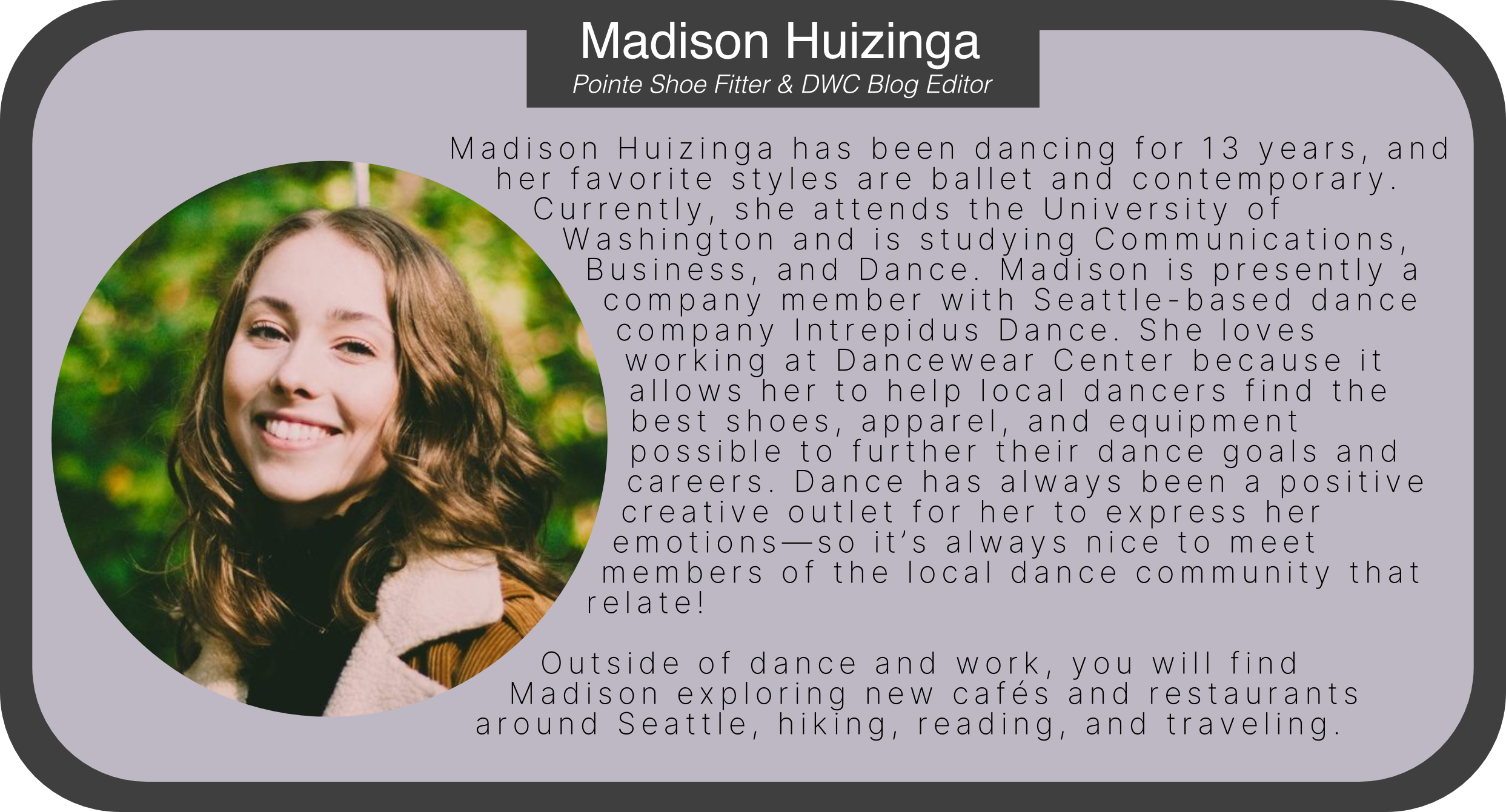Mental Recovery in the Dance Realm
with Niki Kothari, DWC Ambassador
By Madison Huizinga, DWC Blog Editor
click below to shop the look:
For many, dance is a means of mental escape from the day-to-day stressors of life. Having a creative outlet that allows for self-expression, laughter, and challenge can be extremely valuable to live a balanced life. Nevertheless, there are times when dance can go from being a stress reliever to the source of stress itself. Local dancer and DWC Ambassador Niki Kothari speaks on perfectionism, the fear of being judged when going “full out” in dance, and how having social support and stress-relieving activities can help reignite the passion for dance that can sometimes feel lost.
Like many young kids, Niki began dancing early in life around the age of three. She took classes in tap, ballet, and Bollywood styles of dance. Niki stopped dancing for a while in elementary school to try other sports but returned to it around the end of third grade. “I started with just hip hop because I thought it was so cool,” she explains. Eventually, she added back ballet, jazz, and contemporary before joining the competition team at her studio.
While dance can be a great way to connect with yourself and an external audience, there are undoubtedly some elements of the practice that can be mentally taxing. Niki shares how it can be stressful to feel everyone’s eyes on you, particularly the eyes of critical dance instructors. “I always feel like I’m being stared at,” she shares. Niki points out that always feeling like she’s being watched can cause her to put her guard up and not dance “full out.”
Niki recalls feeling this way when she was practicing a competition solo last year. She explains not being eager to show her solo to others at the studio unless she was rehearsing, and even then, “still kind of mark[ing] it” rather than performing full out. At her first competition, she asked her dance teacher to not watch her solo due to her nerves. “I had all my friends backstage with her, making sure she wasn’t out there, watching me,” Niki describes.
Another mental obstacle Niki faces in dance is encouraging her brain to allow her body to heal when recovering from an injury. It can be hard to wrap her brain around the fact that the body often needs rest to heal and can’t constantly push itself. Many dancers grapple with the added challenge of perfectionism and the pressure to push through discomfort, which can compound with this issue to make taking needed rest a tough mental predicament.
Dealing with complex mental sensations and emotions about dance can be difficult. There isn’t a foolproof way to rid yourself of them. However, it’s certainly useful to remind yourself that you aren’t alone in the way you’re feeling. Niki explains that it’s often helpful to talk with her friends about the mental challenges she’s facing in dance, such as her uneasiness about constantly being watched and scrutinized by dance teachers. Even reaching out to your dance teachers or studio director and communicating the emotions you’re feeling can be effective, as they can collaborate with you to find out how to best support you in class.
click below to shop the look:
Marquise Leo by Jule Dancewear | Perfect Fit Shorts by Cloud & Victory
Niki also shares that writing in a journal can help her take care of her mental health. Journaling is a useful tool for many people to work through their challenges and practice mindfulness, all of which are important for the dance realm. Niki says that it often helps her mentally to write “letters” to the people or things that are making her particularly happy or upset, but not sending them. This strategy can be a great way to gain some sense of her emotions.
Further, capitalizing on time outside of the studio can be just as significant as the time you spend in the studio. Taking time to do activities that fill you with confidence and allow you to be mindful of uncomfortable emotions can translate to more assurance and mindfulness in the studio and on stage.
Since physicality is such a crucial aspect of dance, many industry professionals take care to preserve the physical health of performers. However, across the dance industry, taking strides to maintain and improve the mental health of students is just as important. Niki says that teaching students that it’s okay to “laugh at yourself” is useful, as “we’re going to mess up and that’s okay.” As hard as they may try, dancers are infallible people and can’t be expected to do everything perfectly. Cultivating a safe space in the studio where dancers can feel comfortable making mistakes can lead to them feeling confident and dancing more fully out.
In addition, promoting genuine, holistic dance training that covers mental health maintenance can be invaluable for dancers. Niki recognizes that many studios are offering mental health workshops, but that they can often come off as performative, as the principles promoted aren’t translated across the rest of the training experience. Shifting this attitude to valuing mental health comprehensively would be more effective.
It’s possible to love dance and also face mental challenges from time to time when training and performing. These two phenomenons can happen together, not always separately. Through using individual coping tools like talking with trusted loved ones and journaling, and advocating for holistic, mental health-focused training industry wide, there is a way to help lessen the discomfort that can arise in our brains when dancing.


